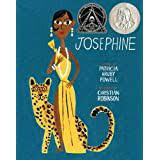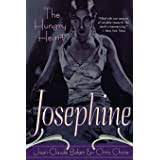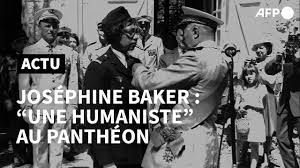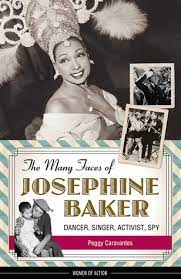GoodReads meta-data is 208 pages rated 3.68 by 144 litizens.
Genre: biography.
Verdict: A singularity!

Josephine Baker (1906-1975) of East St Louis Missouri was illiterate and unwanted, married at age 13, and abandoned at 15, all of this does not sound like a good start in life. Yet before she was twenty she had a national reputation, soon followed by an international one, and a career singing, dancing, and starring in film.
She started in show biz by washing dishes in a gambling-club kitchen at about fourteen. In breaks she watched the floor show and volunteered to work unpaid as a maid for one of the performers after finishing in the kitchen. That performer began to teach this teenager to read and write as recompense for her work, and invited her to come along on tour, and off Baker went without a backward glance. (She was slow learner and even years later while she could read printed text with difficulty, say on programs, but she could not decipher even copperplate writing, and barely do more than scrawl her own name.) Then one night at another club, a member of the chorus line fell ill, and the director grabbed Baker (because she was the same size for the costume) and put her at the end of the line. Not knowing what to do, she stumbled around and got laughs. The director liked that, and the audience applause ‘electrified’ her, she said later. She was, as they say, stage struck and stayed that way, beginning a fifty year career on the boards that end in a 1975 swan song.
In the earliest days, travelling with a troupe of women, she experienced lesbian sex and that stayed with her, but she also liked men when they were available. She was a lifelong switch hitter.
This might be the place to indicate a conflict within her that the author handles well. On the one hand, Baker wanted a conventional life of husband, home, and children such as she had seen in magazines and movies, but never experienced personally, but on the other hand the limelight’s beckon was irresistible and the gaudy and bawdy life of sex and drugs that went with it. At times she oscillated between these two poles.
As a dancer she had a daring (topless at times and that banana skirt), an energy, a vitality, and physical wit that caught the eye of a producer preparing a revue for Paris and looking for fresh talent in the States, who recruited her. At no more than sweet sixteen she went from last in the line chorus girl sharing a room with three others with one meal a day, to a luxury suite on an ocean liner bound for Europe. The transition went to her head and for years thereafter she behaved like a spoiled brat rock star or oafish star athlete with tantrums, laziness, rudeness, and so on. Some of those outbursts arose from the clash of those two poles: domesticity versus show biz.

In time — years — she did grow out of these childish ways but she was never the professional who was on time, on target, on budget. She was often late, unprepared, and exhausted. But once she got in the limelight, the current flowed. Late, yes, but never absent. She always turned up.
She was one of those who put the ‘Roar’ into the Roaring Twenties, and she pretty much did, on this telling, take Paris by storm. As a teenager, she was the headliner of Folies de Bergère with her picture plastered onto every kiosk in Paris, playing to sold out houses eight shows a week. Her petulance did not intrude on the stage, though she often missed rehearsal and ad libbed her way through. In this period she waged a campaign to sing rather than (just) dance, and when a lead singer got sick, Josephine stepped in because she had learned all the songs.
Men, there were more than a few moths attracted to this flame. She soon learned that white men might shower her with gifts, take her to Maxim’s, buy her astounding clothes, pay for ever grander apartments as a trophy, and adorn her with precious jewels, but marriage was, as one said, ‘out of the question.’ Her conclusion from these experiences was a personal declaration of independence, made possible by the money she was raking in; she would buy everything for herself. Ergo she thence turned down and sent back innumerable gifts from many rich and famous men (and some women). She still liked men, but on her terms, not theirs. P.S. She also still liked women.
A producer in her first years in France had been a mentor who tutored her in French, table manners, dressing and so on as part of his investment, and now, in these subjects, she was motivated to be a quick learner. Through the years she remitted money to her mother and siblings in St Louis. After the War she convinced all of them to join in France and she bought and remodelled a chateau for them.
The boite du nuit patrons kept coming during the Great Depression and the money kept coming, if in smaller quantities, and she kept spending it, trying hard to outdo other celebrities with bizarre behaviour and dress. All that has a contemporary ring to it. She concentrated more on singing, in French, than on dancing, and that extended her career. She also branched out into products like hair gel, clothes, and jewellery, reaping the profits. She became one of the richest women in the world, and perhaps the only one at the time who had made all the money on her own talents. It was at this time that she began supporting children’s charities, giving away a great many francs with no tax benefit in so doing. However much money came in, more went out. She always spent faster than she earned, and in time that deficit caught up with her.
In 1934 she married a Frenchman, a Jew, and became simultaneously French and Jewish in so doing according to the laws of the day. At the time she added the accent agui to her name to make it French – Joséphine. Briefly, they had the home life a good part of her had always longed for, but then happily pregnant, she miscarried and that tragedy came between them, a year later the husband decamped, and she became ever more temperamental, while throwing herself even more frantically into work.
She made a French talkie called ZouZou (1934), and by this time was fluent in conversation. She never liked movie-making because there was no audience. Having toured European capitals several times with critical, popular, and financial success, in that year she accepted an invitation to return to the United States to star in a production of the Ziegfeld Follies. She and her European entourage arrived in New York on a luxury liner to great fanfare at the docks thronged by journalists and photographers. Off they went to the first class hotel booked for the group, where she alone was denied registration because of her race, and she was likewise denied at three other downtown hotels, before she gave that up to bunk with a woman journalist who had accompanied her from the pier. Welcome home! Everything went faster and further downhill from there, the show closed, and she returned to Paris.
Came the Drôle de guerre in 1939 and she volunteered for service and went to entertain the Allied troops, being well suited to do so with a repertoire of English and French songs familiar to the lads et les gars. She was paired with the likewise bilingual Maurice Chevalier, who was a mega-star of the day with the ego to match. He regarded her as a cheap nightclub chanteuse and insisted that as he was the star her act precede his as a warm-up. (And, non, before you ask, he would not do a duet with this parvenu.) He got his way and regretted it. In school, town, and church halls with hundreds of bored young men who had been away from home for weeks and months, she was a sin-sation and they would not let her leave the stage, demanding encore after encore, enraging Chevalier waiting in the wings. He threw a fit and stormed off, leaving her with a one-woman show, which incidentally won her fame among Brits and expanded her fame in France beyond Parisians.
Came the Defeat in June 1940, she was approached by a brother of a stage manager: it could be arranged that she would be invited to perform in Lisbon, would she then carry a message encoded in her sheet music? Bien sûr, because ‘I owe France everything.’ The bet was that since Portugal was a friendly neutral, the Germans would permit the trip. That worked and she did it again, and again, and no Gestapo inspector would be inclined or able to read the sheet music. Then a tour of French North Africa was arranged for the same purpose where she fell ill and after an emergency operation she got blood poisoning and was long confined to a hospital bed in Rabat where she lay when Operation Torch was executed. Bitter though she had become about American racism, she nearly danced in the street when she saw the Stars and Stripes on the shoulders patches of the GIs. Soon she was entertaining more troops across North Africa, Free French, Brit and Commonwealth, and Yankee. Four shows a day with a jeep ride over no-roads to the next camp for months, which – given than she was still recovering from repeated surgery when it started – wore her down. These travels were burning in the day time and freezing at night, and often required sleeping on the grounds or in the vehicles. General Charles de Gaulle asked her to accept induction into the French Women’s Auxiliary Army, which she did with enthusiasm. She also embarked on a fundraising campaign for de Gaulle, starting by selling her jewellery and clothes. She would say later in jest but also in truth that she gave France the clothes off her back in return for a uniform. By the way that illness in Morocco ended any prospect of children.

Despite the wartime rhetoric of equality, when she returned State-side she was once more barred from hotels and restaurants in Boston, Miami, and again in New York City. In this latter instance she complained vociferously and was then labeled a communist agitator by no less a figure than Walter Winchell – king of the airways at the time – who, with the respect for facts one associates with Pucker Up on Pox News, later also styled her a fascist. (Local lout-mouths like Alan Jones have long aspired WW’s crown.)
More important in cementing her reputation as a pinko was her insistence on performing only to integrated audiences. She turned down astronomical fees from segregated venues – what could be more Un-American than that? Worse, whenever this happened she made it known through the press that a certain promoter or venue refused to allow an integrated audience. Joe Louis, Jack Robinson, Eleanor Roosevelt, Robert Warren, and other civil rights activists soon flocked to her shows. It was at this time that she discovered a talent for public speaking and she went on the stump for civil rights. That put her on one of J. Edgar Hoover’s many enemies lists which often made it difficult for her to get an American visa, one requiring the direct and personal intervention of the United States Attorney-General Robert Kennedy.
There is a long story about her Rainbow Tribe which I will omit. Suffice it to say she collected orphaned children as she had earlier collected animals for a private zoo. Superficially the intention was good, but the execution was abysmal. There is an appendix devoted to these children.
She never had any sense about money, and that caught up with her in the latter 1950s when a postwar generation of performers competed for opportunities. Protracted and painful was the decline, she had to sell everything to keep the bailiffs at bay, the jewels, the cars, the houses, … the clothes [again]. By the time she was sixty, Baker was destitute and homeless, singing in the Paris equivalent of the St Louis clubs where she had started forty-five years before. Under these pressures the old, volatile temper vented and she became just about impossible to deal with. It was a speedy, downward spiral.

She was saved from herself by Princess Grace of Monaco who paid her debts, bought her a house, and set up a trust fund with a modest income and a principle that Joséphine could not touch. In return Baker performed regularly at Red Cross fundraisers. And there is a remarkable story of a journalist sent on a publicity interview prior to one such event going to Baker’s apartment a day early by mistake, and…. A bent, shrivelled, bald, shrunken old women dressed in a ragged robe, shuffling, drooling, and sniffling, answered the door and wobbled walking to the sofa. Slowly Journalist realised this was Joséphine Baker herself. Yet, the day after when the gala opened she was straight, coiffured, gleaming, vigorous, vital, and glittering, offering a full-throated performance with dancing, jokes, and many encores. The show had to go on and it always did. Despite the chaotic life she led over the years, she honoured every performance contract and delivered on stage. At times critics found the material poor but no one ever said she did not give it the works once in the spotlight. Audience attention was the eau de vie to which she was addicted.
At the last of these galas she did an impromptu singing and dancing duet with Mick Jagger, and over night died of a heart attack. One obituary writer said with some truth that she had danced herself to death.
The concoction she used to straighten her hair since the early 1920s had led to the baldness. Her diet was terrible and, given the milieu, she no doubt drank alcohol to excess and used drugs though the book is silent on these matters.
Loose ends: She marched in every Bastille Day parade wherever she was in France, wearing that auxiliary uniform with her service medals attached. She was on the steps of the Lincoln Memorial on the great day that Dr King spoke, and did many fund rising performances for the NAACP when she was Stateside, and became very close to Coretta Scott King who tried to get her to move back to the country of her birth.
* * *
Seeing on Télévision France 2 a report on the interment of Joséphine Baker’s remains in the Panthéon (in Paris), prompted my interest in finding out more about this legend. So I did what book worms do and went looking for a biography. A title for young adult (= old enough to vote) readers suited me fine. That means it contained sidebars to explain some of the historical context, like the Depression, Folies Bergère, and the like. Many of the other titles on her that I checked were marketed for the salacious tales, sensational gossip, and Pox News value it seemed from my sampling. Compared to that pap, this one appeared sober, sane, and straightforward, no striving for shock value or gutter glamour. The author has a number of other biographies of the same sort.

Stepping back from the details of those other titles, it seems to me that many of the biographers do not take Baker seriously, despite the lip service to the contrary, but rather present her as a particularly determined party-girl made unique in the time by her colour, her expatriate life in France, and her longevity as a performer. Few of these titles, perhaps fearing that they might scare off readers, hint at the depths, determination, and moral core she must have had to live her own life, let alone perform the services that led to the Panthéon. They just cannot quite get beyond the banana skirt with anything but platitudes in so far as I could judge from the Kindle samples.

